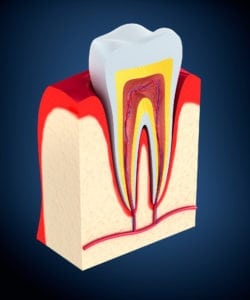Do your gums bleed during your oral hygiene routine?
Bleeding gums is often an indication of a serious oral health concern. In most cases, bleeding gums is an indication of gum disease. Gum disease occurs when the bacteria in plaque reaches the gum line, causing the irritation, swelling, and bleeding in the gums. If bleeding gums are not addressed, it can lead to progressive oral health concerns that compromise the health and function of the gums, teeth, and jaw bone structure. As gum disease progresses, the teeth begin to pull away from the gum line, deep pockets filled with pus begin to form, and eventually, the supporting tissues supporting the teeth begin to deteriorate. Gum disease remains one of the leading causes of adult tooth loss. Early diagnosis and treatment of gum disease may reduce your chance of experienced severe damage to the teeth and gums.

If you are experiencing bleeding gums, it is important to schedule an appointment with your dentist for a routine screening for complex dental concerns. At Loyalsock Dental in Williamsport, PA, we educate patients on the importance of improving and maintaining healthy gums. In essence, healthy gums promote a healthier, more functional smile. Our team works with each of our patients one on one to recommend personalized solutions and treatments to address their unique oral health needs.
Stages of Gum Disease
Periodontal disease has two main stages: Gingivitis and Periodontitis.
- Gingivitis: Gingivitis is the earliest stage of gum disease. During gingivitis, patients may experience bleeding gums, gum irritation, or red, swollen gums. Some patients with gingivitis don’t experience any symptoms at all, which is why we stress the importance of routine dental exams. Dr. Kim is trained to spot any early signs of gum disease and create a personalized solution based on your needs.
- Periodontitis: Periodontitis is categorized as the most advanced stage of gum disease. During periodontitis, patients may experience shifting teeth, loose teeth, receding gums, or changes in the fit of your dentures. If periodontitis is left untreated, patients may experience jaw bone deterioration which will lead to tooth loss.
How To Treat Bleeding Gums
Gum disease is one of the most common dental concerns amongst patients of all ages. Gum disease is commonly referred to as the “silent disease,” because some patients to exhibit any symptoms until the infection has reached the most advanced stage. Routine visits to the dentist allow our team to screen for gum disease and recommend any necessary treatments. Dr. Kim Provides routine screenings for complex dental problems during your preventive care examination.
Common Signs of Gum Disease
- Bleeding Gums
- Halitosis
- Receding Gums
- Loose Teeth
- Shifting Teeth
- Red, Swollen Gums
- Irritated Gums
If your gums bleed, it should be addressed as soon as possible. Dr. Kim recommends patients visit our Williamsport dental office for a screening. Loyalsock Dental offers a full range of treatment options to treat all various stages of gum disease. Dr. Kim can work with you to create an effective, personalized solution that improves the health, function, and appearance of your natural smile.
We offer a full range of dental implants, cosmetic, general and restorative dental care services to address bleeding gums.
Bleeding Gums FAQs
When should I be worried about bleeding gums?
Bleeding gums can happen to everyone. You may brush or floss too aggressively, occasionally causing bleeding. However, if you notice this is happening frequently, it’s time to get it looked at. Bleeding gums are one of the main signs of the early stages of gum disease.
Can bleeding gums mean heart disease?
Bleeding gums doesn’t automatically mean that you have heart disease. However, there is a connection between gum disease and heart disease. The inflammation and bacteria that cause gum disease can make you more likely to have problems with heart disease. These problems can enter the bloodstream, causing issues throughout the rest of your body.
Can I do anything to help bleeding gums at home?
Before you’re able to be seen in our dental office, saltwater rinses can help the symptoms of bleeding gums at home. Salt mixed with warm water can help ease the inflammation of your gums and help draw the infection out.
